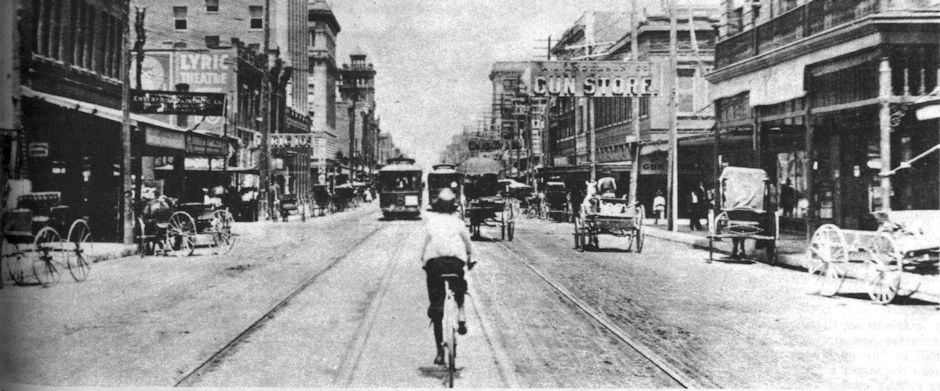On the east edge of downtown, hunkered on two square blocks, are five buildings that are easier to see than to reach.
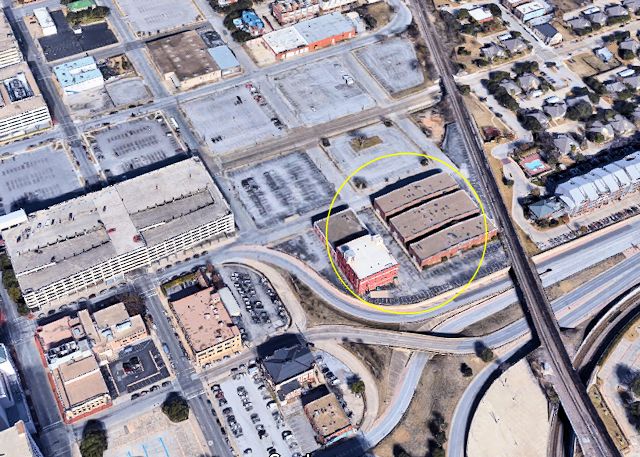 The buildings are wedged between parking lots on the north, Spur 280 on the south and west, and railroad tracks on the east.
The buildings are wedged between parking lots on the north, Spur 280 on the south and west, and railroad tracks on the east.
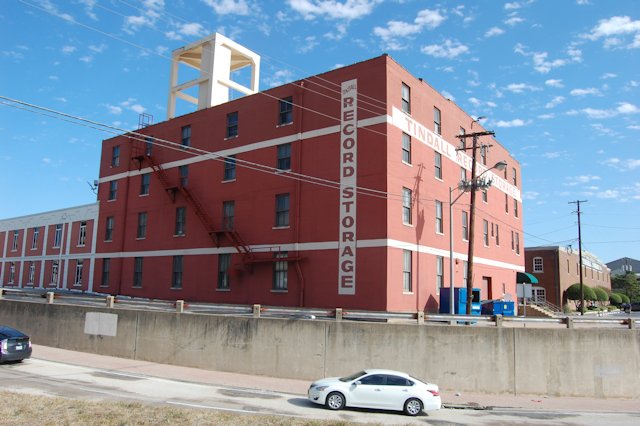 The most prominent of the five buildings has “Tindall Record Storage” painted on it.
The most prominent of the five buildings has “Tindall Record Storage” painted on it.
But there’s more to that building—and the other four—than boxes of invoices and receipts.
There’s a heap o’ history.
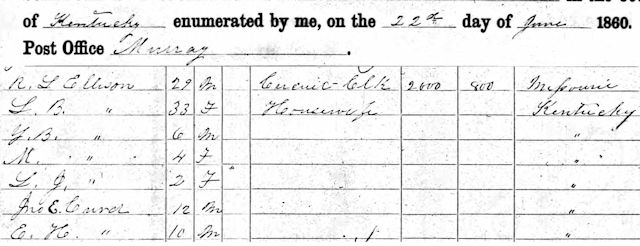 Thomas B. Ellison was born in Kentucky in 1854 to Colonel Robert L. and Lucy Curd Ellison.
Thomas B. Ellison was born in Kentucky in 1854 to Colonel Robert L. and Lucy Curd Ellison.
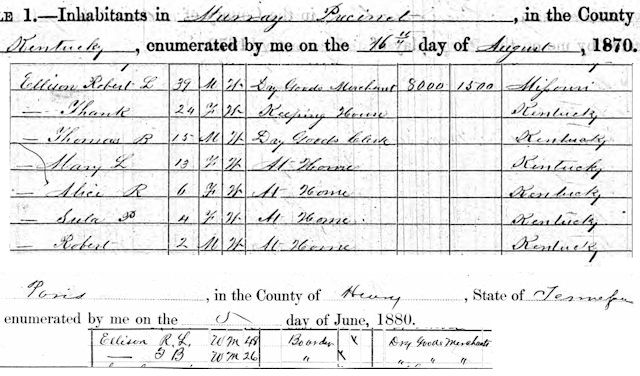 The 1870 and 1880 censuses show that both father and son were engaged in the dry goods business in Kentucky. But in 1883 father and son moved to Texas and took up ranching. Thomas B. bought a ranch near Abilene, and his father managed the Shoe Nail Ranch near Childress.
The 1870 and 1880 censuses show that both father and son were engaged in the dry goods business in Kentucky. But in 1883 father and son moved to Texas and took up ranching. Thomas B. bought a ranch near Abilene, and his father managed the Shoe Nail Ranch near Childress.
 By 1887 father and son had moved to Fort Worth. That year Thomas B. went back to Kentucky long enough to marry Annie Anderson.
By 1887 father and son had moved to Fort Worth. That year Thomas B. went back to Kentucky long enough to marry Annie Anderson.
In 1888 Thomas B. and former Tarrant County Sheriff Walter Maddox opened Maddox, Ellison & Company, which sold furniture, carpet, draperies, and caskets in their store at 609 Main Street. At that time most funerals were held in private homes, not in full-service funeral homes. Thus, furniture stores sold caskets directly to the public.
The company sold both wholesale and retail. By 1896 the company also was manufacturing mattresses in a plant on the east edge of downtown.
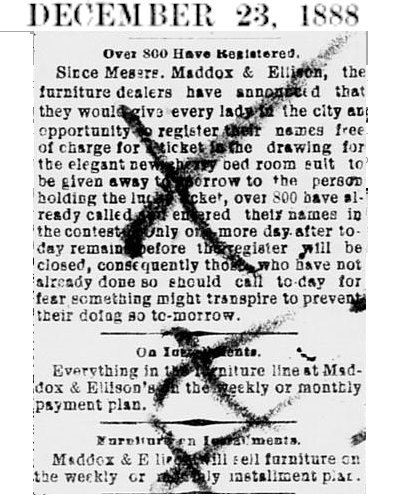
Maddox, Ellison & Company was one of the first stores in town to offer customers an installment plan. Ellison believed that the customer goodwill that credit creates is worth the monetary risk.
In 1891 Ellison’s son Robert Anderson Ellison was born. As soon as Robert could walk, he had the run of the store, trying out the baby rockers, children’s swings, and hobby horses.
It all may have been child’s play to Robert, but his father was grooming him to take over the business.
 The 1892 city directory lists two other Ellisons as partners in the company: Thomas B.’s father and brother Robert L. Ellison Jr.
The 1892 city directory lists two other Ellisons as partners in the company: Thomas B.’s father and brother Robert L. Ellison Jr.
In 1892 Ellison hired the company’s first woman employee in an era when most employers still believed that women have no place in business. It was a good hire: Miss Annie D. Rasbury worked for Ellison for the next fifty-two years.
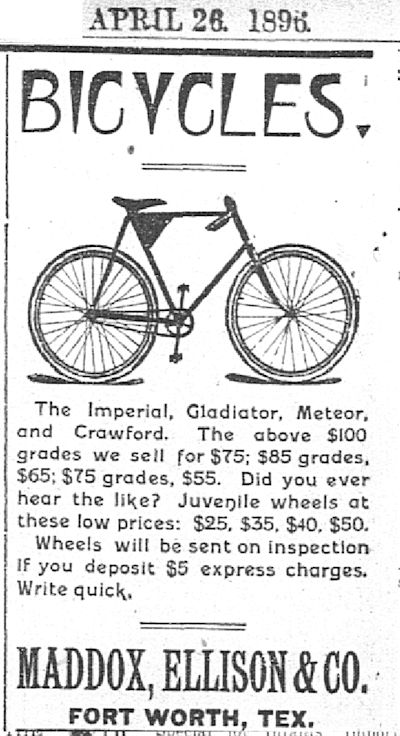 The store also sold bicycles.
The store also sold bicycles.
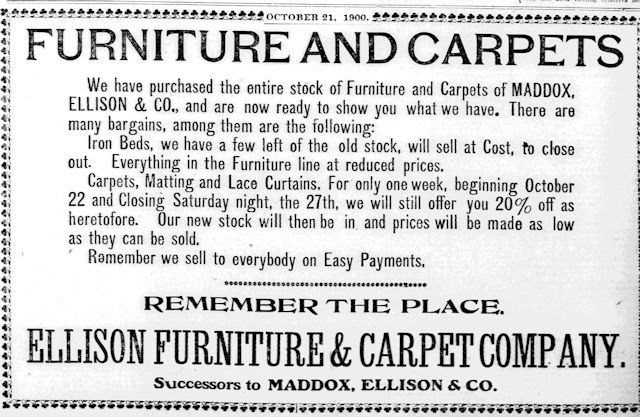 In 1900 Ellison bought out Maddox, who became a partner in another furniture company: Fakes & Company. Thomas B. Ellison was now president of Ellison Furniture & Carpet Company.
In 1900 Ellison bought out Maddox, who became a partner in another furniture company: Fakes & Company. Thomas B. Ellison was now president of Ellison Furniture & Carpet Company.
 By 1903 Ellison had moved his store one block south to 704 Main Street.
By 1903 Ellison had moved his store one block south to 704 Main Street.
The meaning of two terms has changed with time: A “go-cart” was a baby stroller. A “refrigerator” was just a wooden box that held a block of ice to keep food cold.
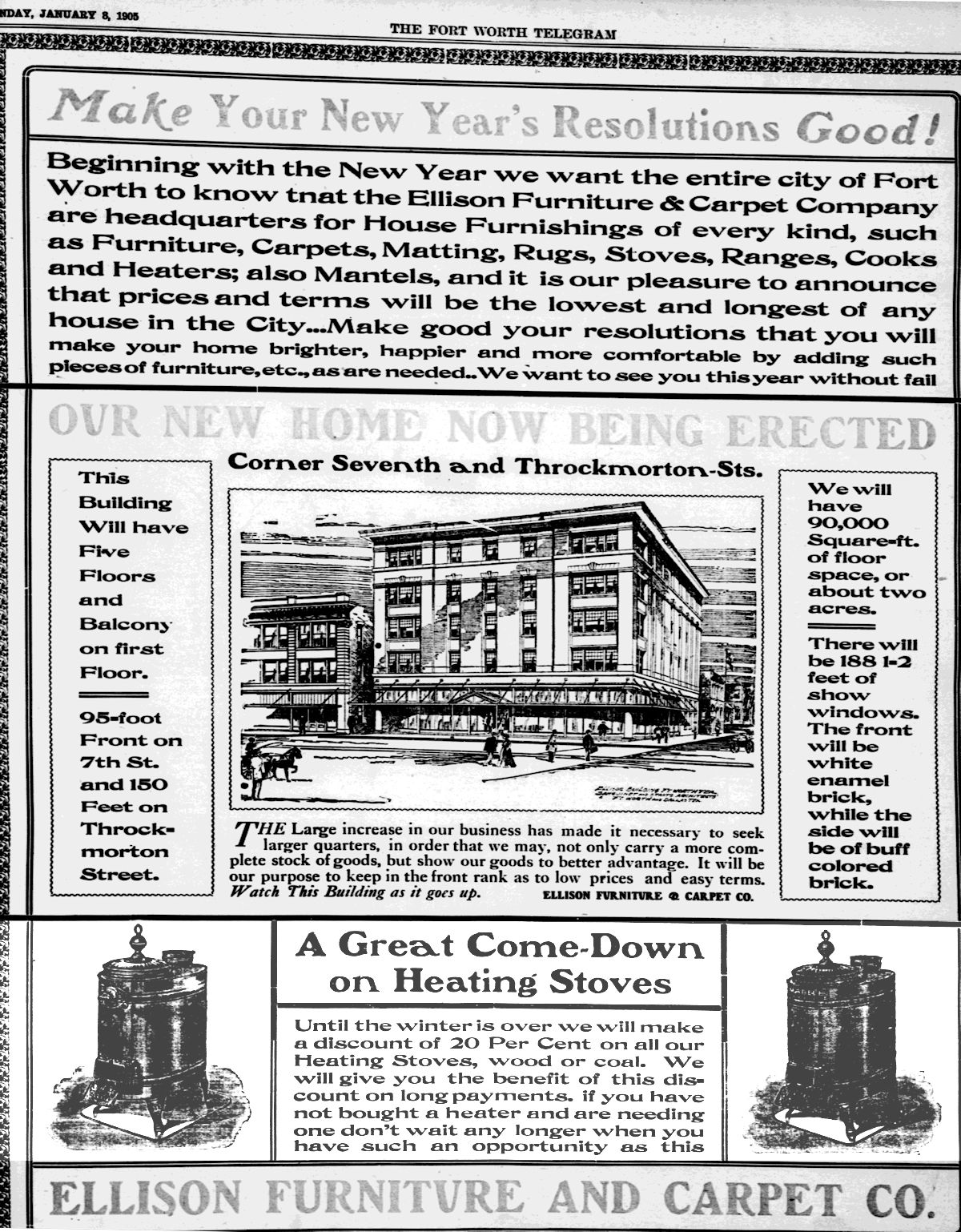
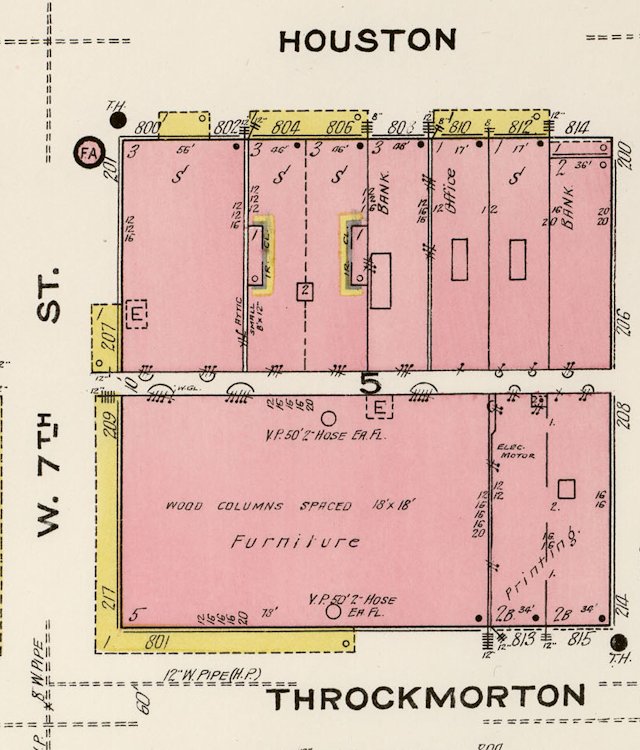 In 1905 Ellison moved his store into a new building, designed by Sanguinet and Staats, at 209 West 7th at Throckmorton Street. The new building was only two blocks west of the Main Street location, but those were two big blocks in 1905.
In 1905 Ellison moved his store into a new building, designed by Sanguinet and Staats, at 209 West 7th at Throckmorton Street. The new building was only two blocks west of the Main Street location, but those were two big blocks in 1905.
Annie D. Rasbury told the Star-Telegram in 1949: “I remember when Mr. Ellison decided to move the store from Main Street to the present location in 1905. Everyone told him he would go broke moving so far out of the business district, but he was a farsighted man.”
Thomas B. Ellison wanted his son Robert to learn the furniture business “from the bottom up.” As a teenager Robert was given a work room in the store to learn to repair broken furniture. He also took apart furniture to see how it was made. Robert eventually worked in every department of the business.
As a teenager Robert received a paycheck each week and thought it was from the company, but it actually came directly from his father, who did not want the company to pay for his son’s education.
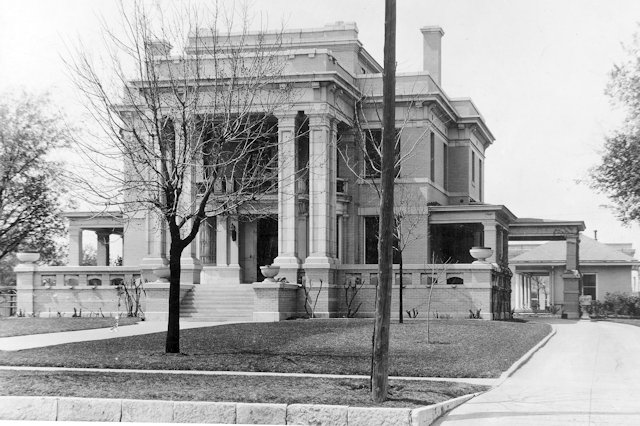
By 1911 Thomas B. Ellison was a wealthy man. He built a mansion at 1304 Summit Avenue on Quality Hill. (Photo from University of Texas at Arlington Libraries.)
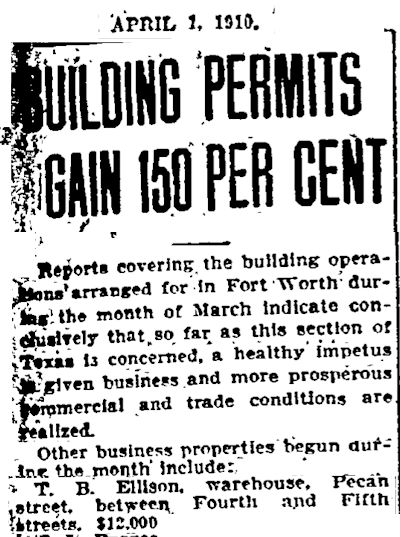 In 1911 Ellison began replacing the Maddox, Ellison & Company’s warehouses and carpet factory on the east edge of town. First he built three warehouses at 505 Pecan Street.
In 1911 Ellison began replacing the Maddox, Ellison & Company’s warehouses and carpet factory on the east edge of town. First he built three warehouses at 505 Pecan Street.
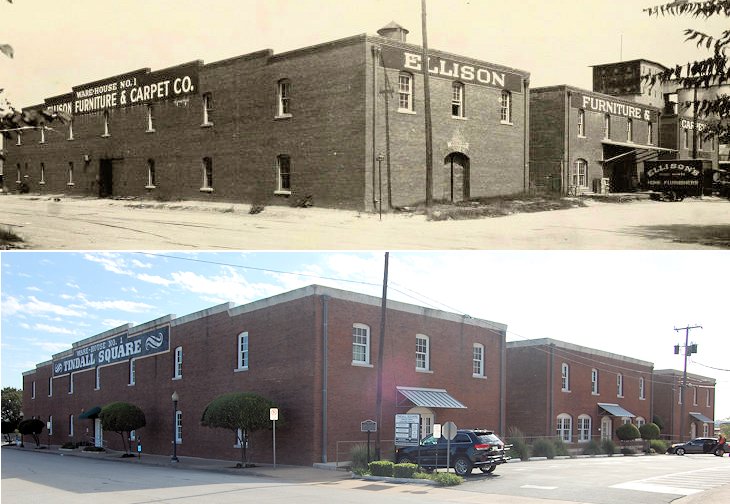 That building behind the three warehouses in the upper right of the old photo was part of the nearby Smith grain mill. (Top photo from Fort Worth Public Library.)
That building behind the three warehouses in the upper right of the old photo was part of the nearby Smith grain mill. (Top photo from Fort Worth Public Library.)
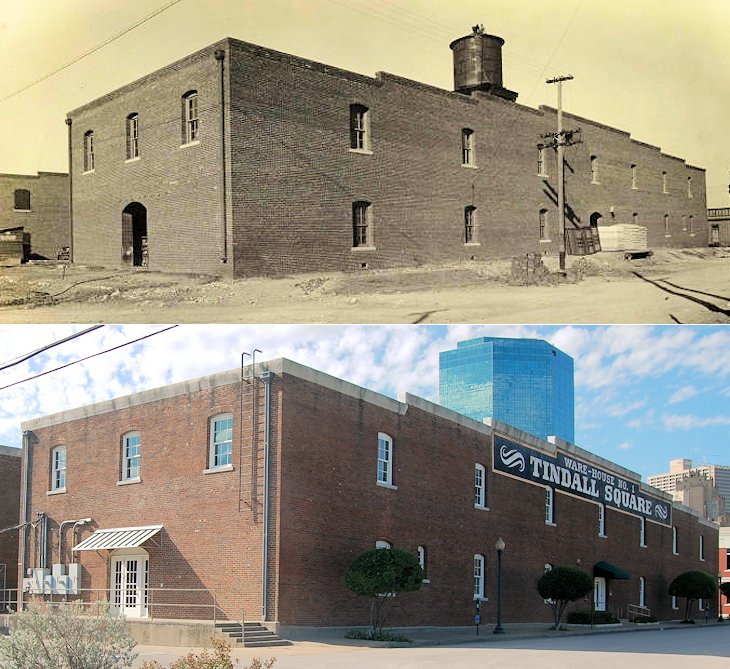 The three warehouses were connected by walkways on the second floor. (Top photo from Fort Worth Public Library.)
The three warehouses were connected by walkways on the second floor. (Top photo from Fort Worth Public Library.)
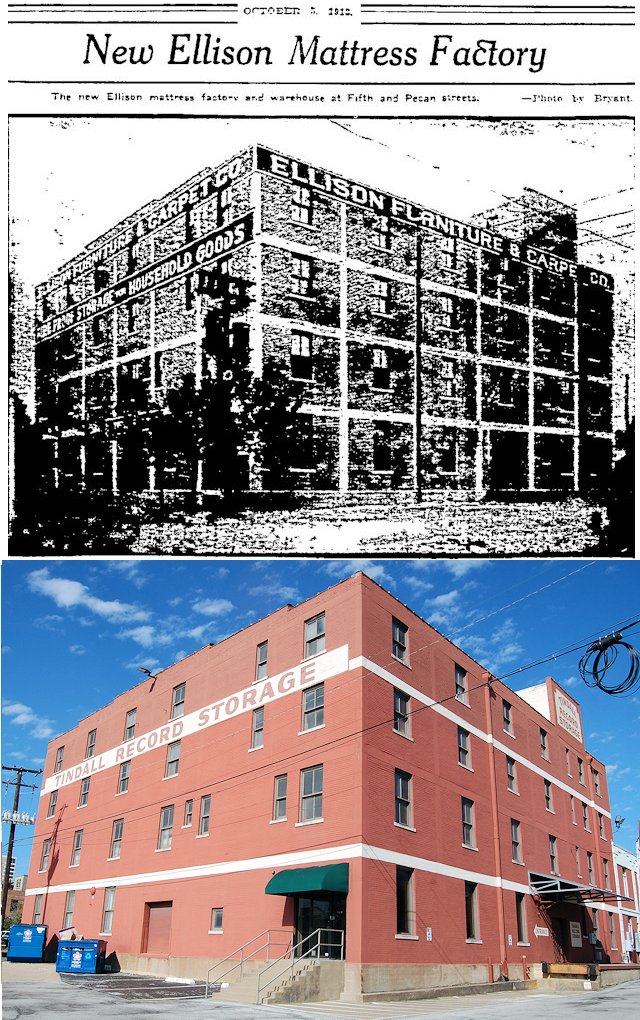 In 1913 Ellison built a new mattress factory at 511 East 5th Street just west of the three warehouses. The factory could make about 275 mattresses a day. The factory building was fireproof and contained storage space for customers who wanted to store their household goods.
In 1913 Ellison built a new mattress factory at 511 East 5th Street just west of the three warehouses. The factory could make about 275 mattresses a day. The factory building was fireproof and contained storage space for customers who wanted to store their household goods.
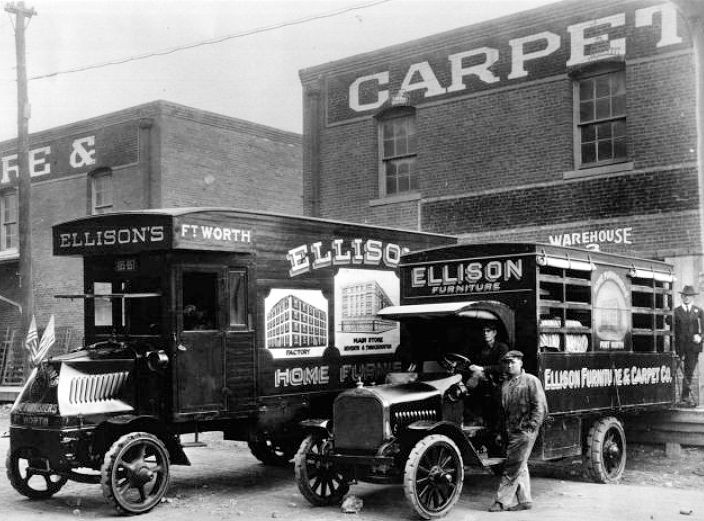 The delivery truck on the left bears images of the 1913 mattress factory and the West 7th Street store.
The delivery truck on the left bears images of the 1913 mattress factory and the West 7th Street store.
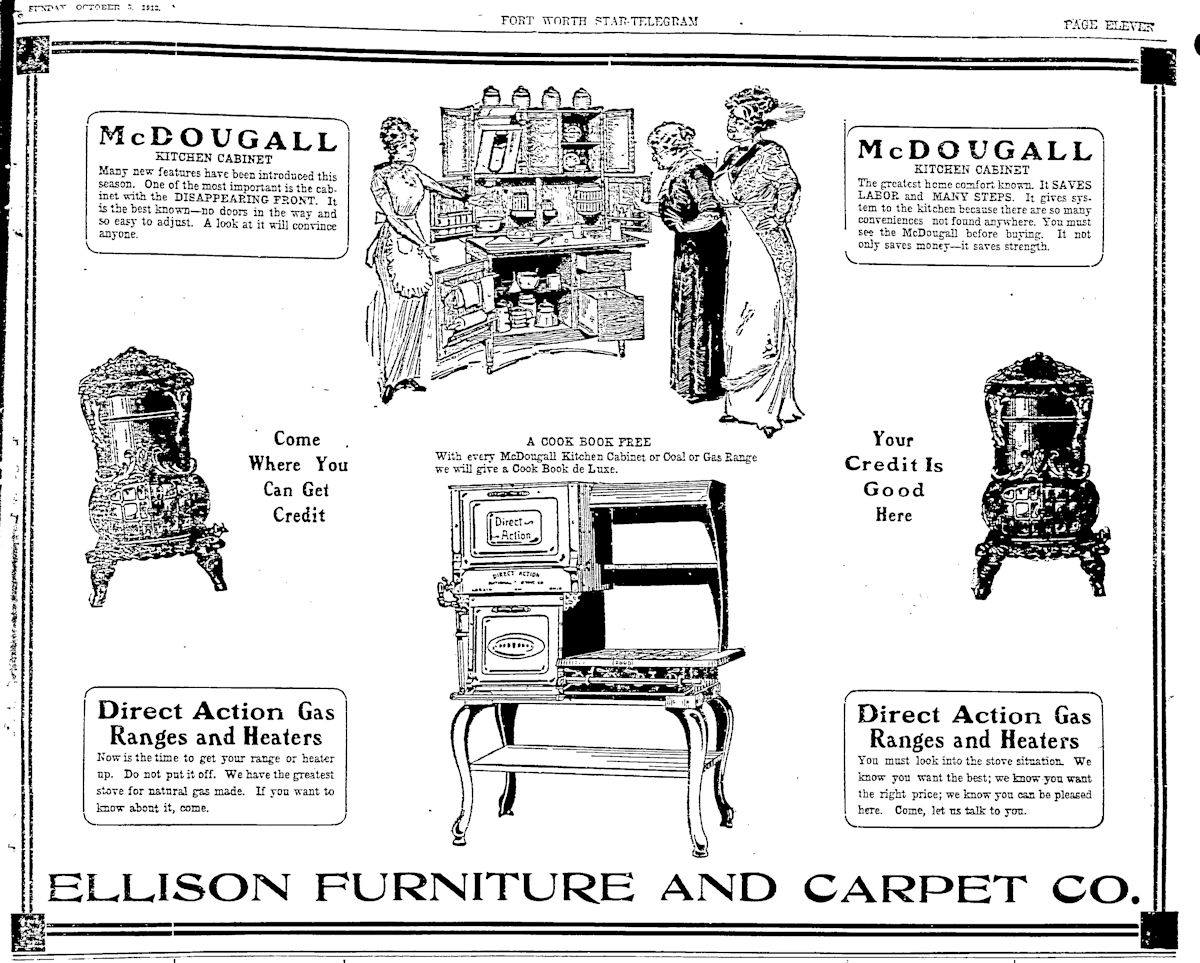 Ellison also sold stoves for heating and cooking. Again note the emphasis on credit.
Ellison also sold stoves for heating and cooking. Again note the emphasis on credit.
Thomas B. Ellison retired in 1919 and devoted his time to raising registered Hereford cattle and Shetland ponies on his 1,300-acre Silver Creek Farm near Lake Worth.
Son Robert became president of the company.
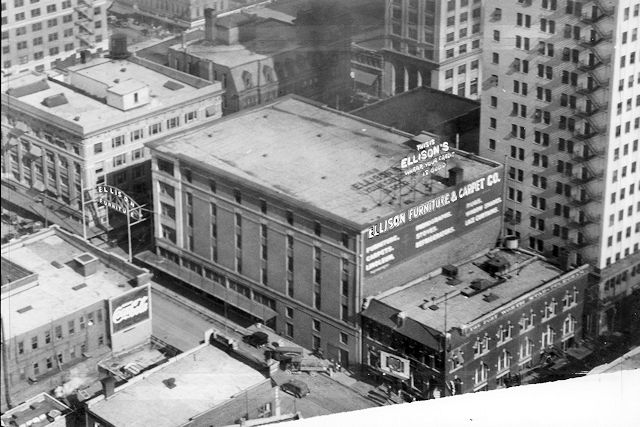
This photo is undated, but I suspect it was taken in 1920. The tall building to the right of the Ellison building is the Waggoner Building, finished in 1920, and the two-story building to the right of the Ellison building was the home of the Star-Telegram until December 1920.
The sign on top of the Ellison building reads “This is Ellison’s where your credit is good.”
Note another sign reading “Ellison Furniture” arching over West 7th Street. (Photo from University of Texas at Arlington Libraries.)
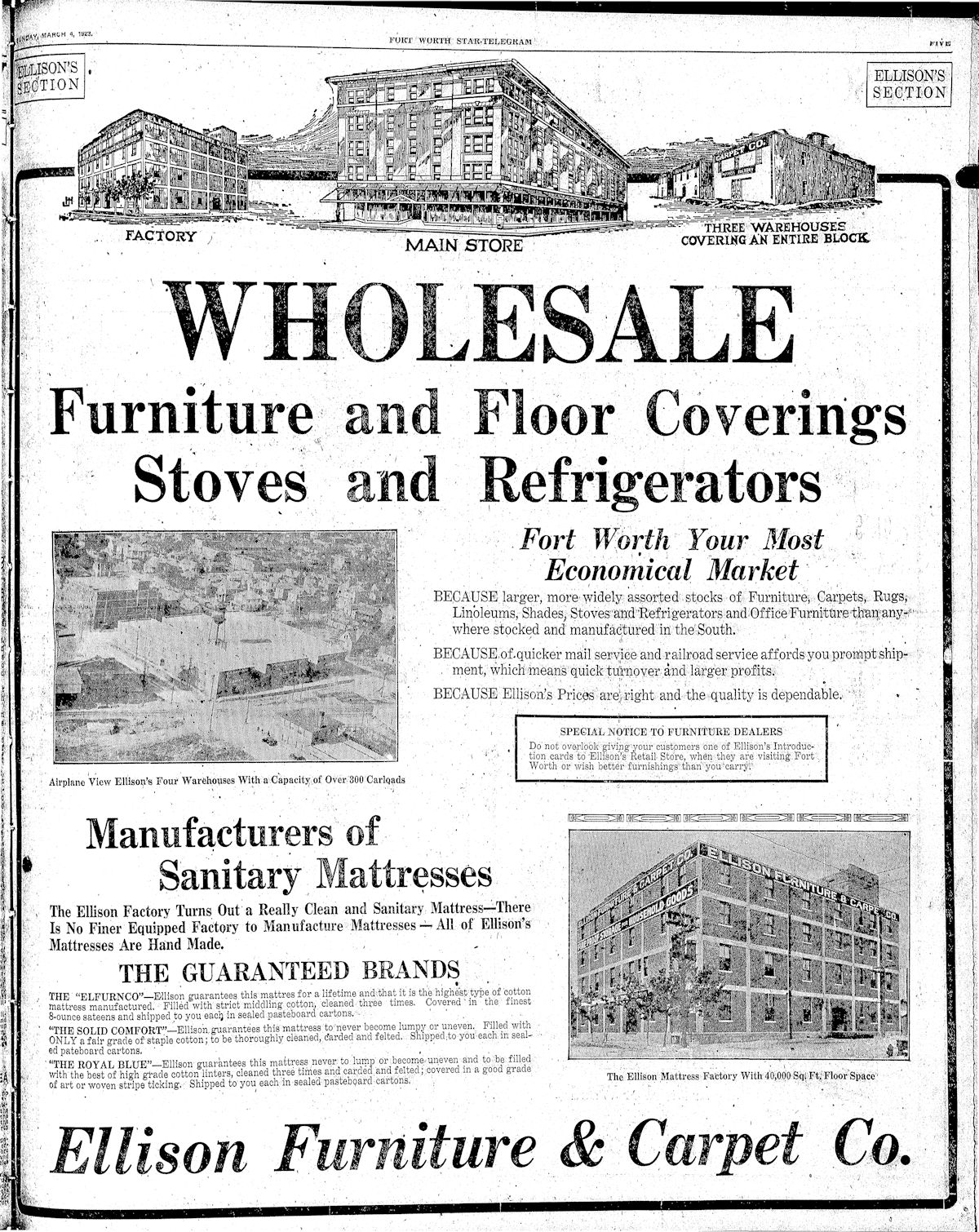 The company was a heavy advertiser in the Star-Telegram with full-page ads and even entire sections.
The company was a heavy advertiser in the Star-Telegram with full-page ads and even entire sections.
This 1923 ad shows the Ellison department store, mattress factory, and warehouses.
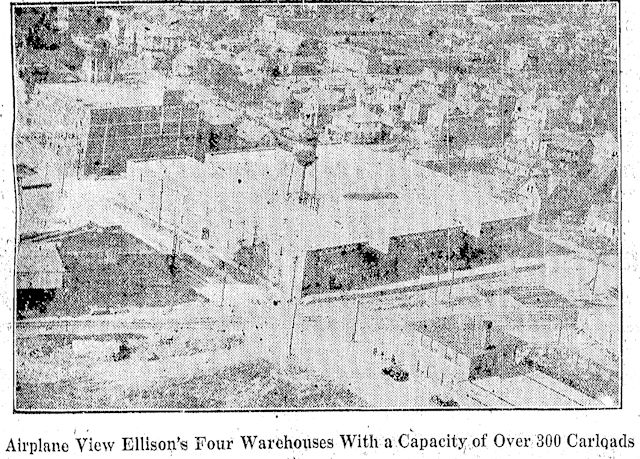
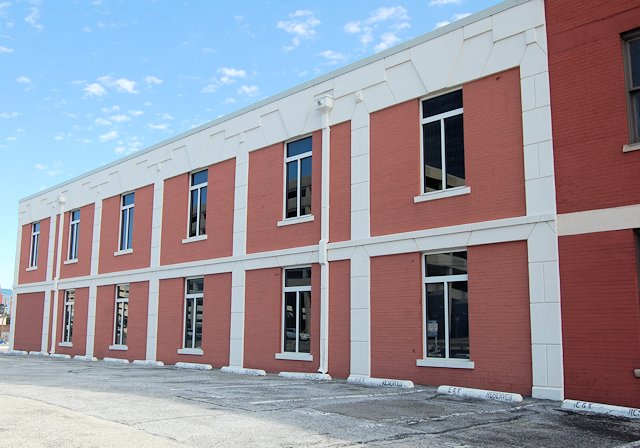 The 1923 aerial photo shows that the two-story building on the north side of the four-story mattress factory was built later. For a while Ellison’s manufactured custom furniture, possibly in the two-story building.
The 1923 aerial photo shows that the two-story building on the north side of the four-story mattress factory was built later. For a while Ellison’s manufactured custom furniture, possibly in the two-story building.
In the lower right of the aerial photo is the freight depot of the St. Louis-Southwestern (Cotton Belt) railroad. It, too, is still standing.
 The employees of Ellison’s—all hatted up—in 1924 posed under the awning that wrapped around the corner of the store at West 7th and Throckmorton streets. (Photo from Tarrant County College NE, Heritage Room.)
The employees of Ellison’s—all hatted up—in 1924 posed under the awning that wrapped around the corner of the store at West 7th and Throckmorton streets. (Photo from Tarrant County College NE, Heritage Room.)
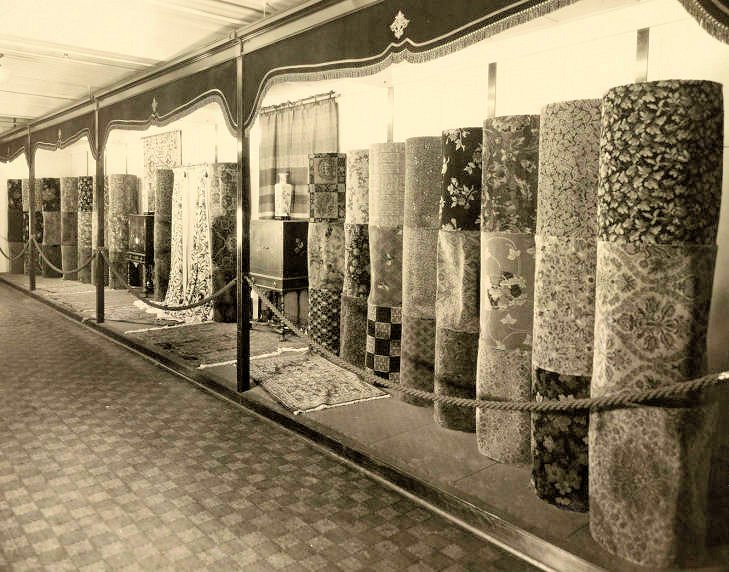 A carpet display at the store in the 1920s. (Photo from Fort Worth Public Library.)
A carpet display at the store in the 1920s. (Photo from Fort Worth Public Library.)
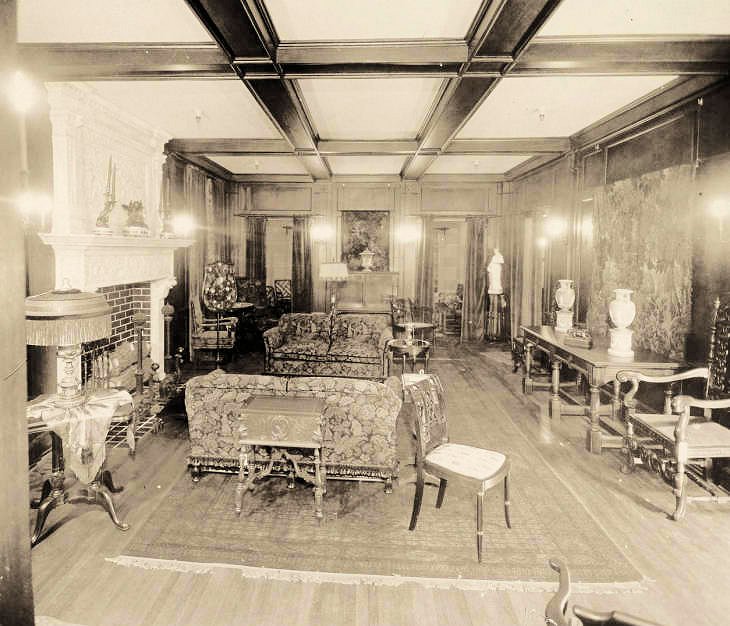 The store featured model rooms to inspire shoppers. (Photo from Fort Worth Public Library.)
The store featured model rooms to inspire shoppers. (Photo from Fort Worth Public Library.)
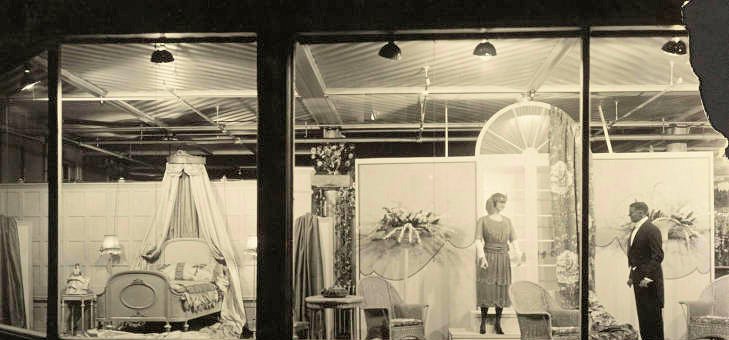 A window display. (Photo from Fort Worth Public Library.)
A window display. (Photo from Fort Worth Public Library.)
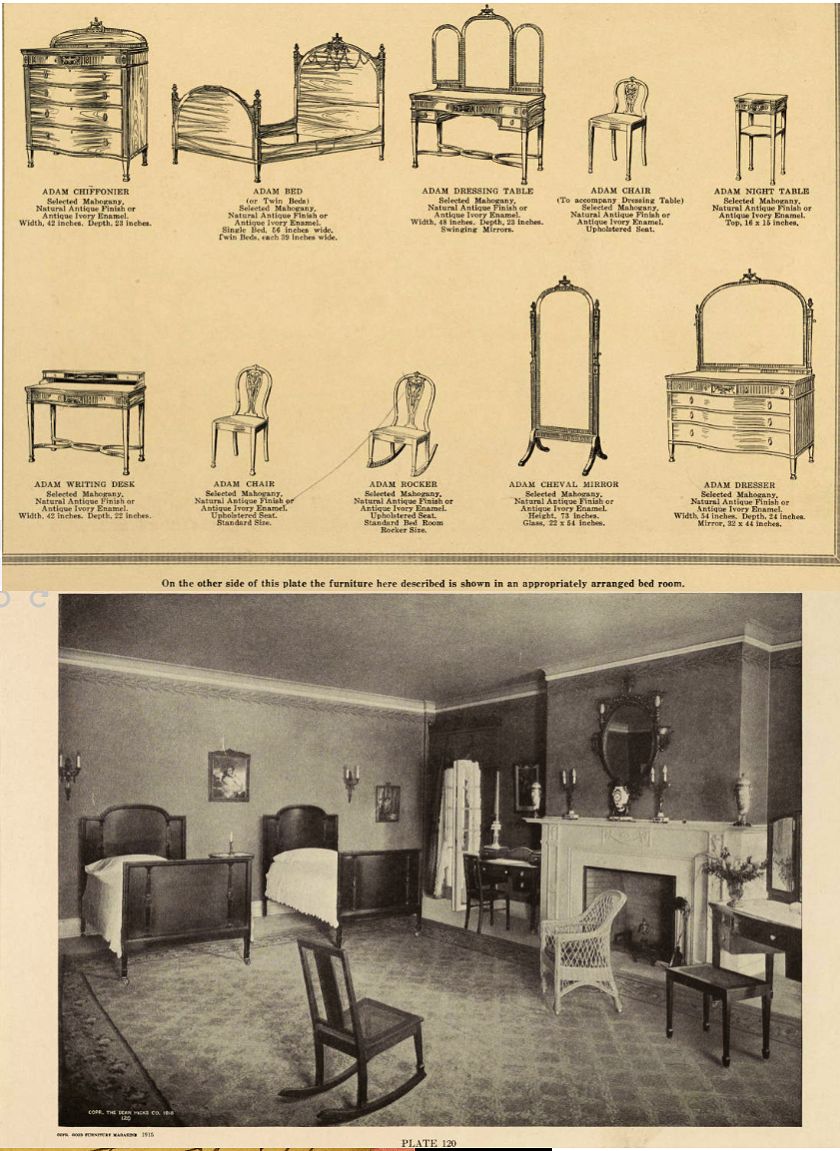 Ellison’s printed a catalog for its wholesale buyers.
Ellison’s printed a catalog for its wholesale buyers.
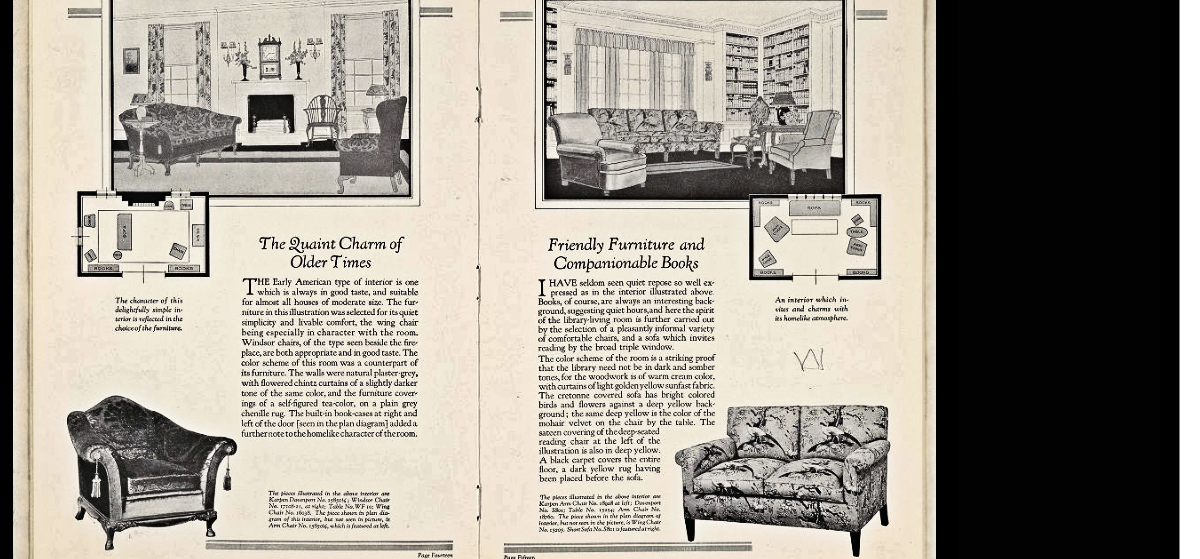 The store also distributed to retail customers the pamphlet Better Homes: How to Furnish Them. (Photo from Fort Worth Public Library.)
The store also distributed to retail customers the pamphlet Better Homes: How to Furnish Them. (Photo from Fort Worth Public Library.)
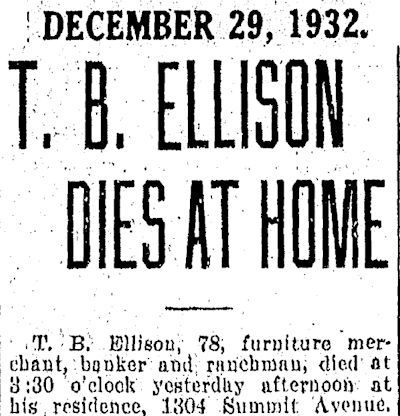 Thomas B. Ellison died in 1932 at age seventy-eight.
Thomas B. Ellison died in 1932 at age seventy-eight.
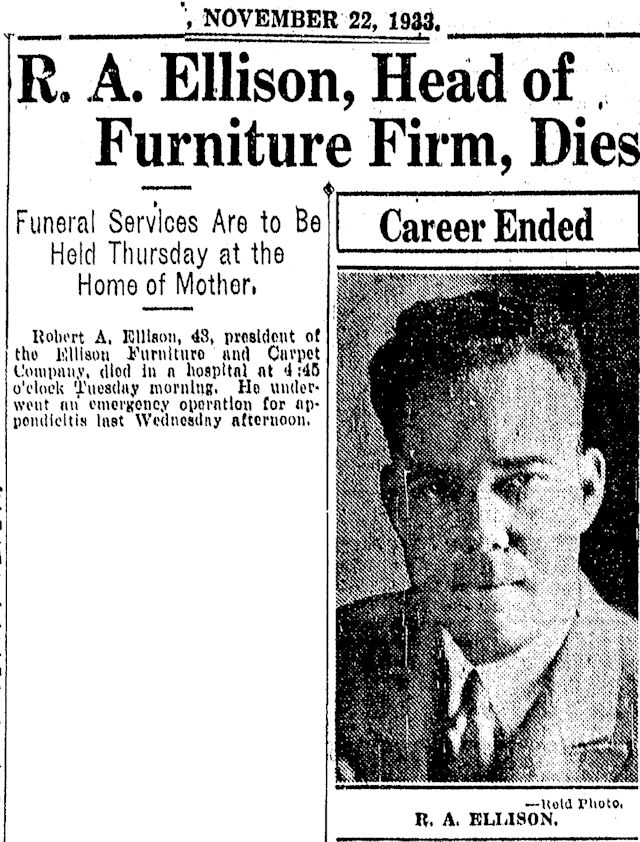 Robert Anderson Ellison died in 1933 eleven months after his father died. Robert was forty-three years old. He lived at 1305 Summit Avenue across the street from his parents.
Robert Anderson Ellison died in 1933 eleven months after his father died. Robert was forty-three years old. He lived at 1305 Summit Avenue across the street from his parents.
Robert’s mother took over as president of the company until her death in 1946.
The Ellison mansion on Quality Hill was demolished in 1965.
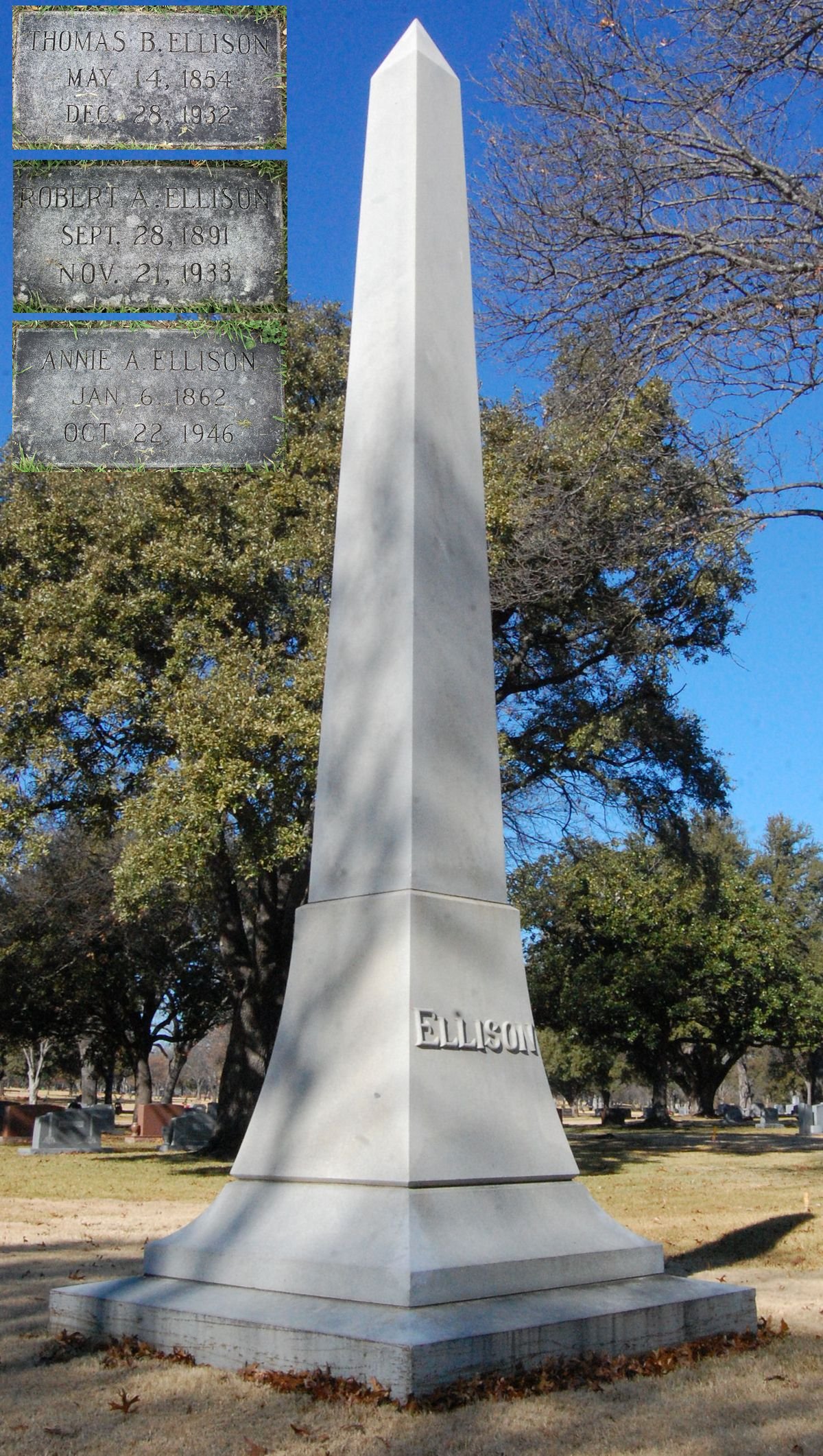 The Ellison obelisk is part of the skyline of Greenwood Cemetery.
The Ellison obelisk is part of the skyline of Greenwood Cemetery.
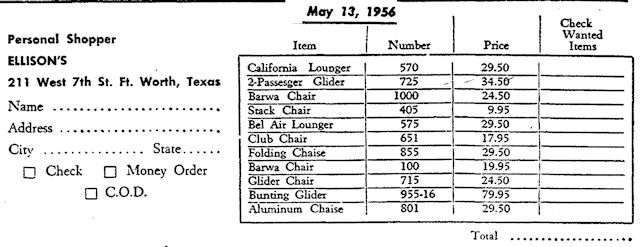 Ellison’s, like most of the downtown department stores, offered customers the option of shopping by phone or mail via a “personal shopper.”
Ellison’s, like most of the downtown department stores, offered customers the option of shopping by phone or mail via a “personal shopper.”
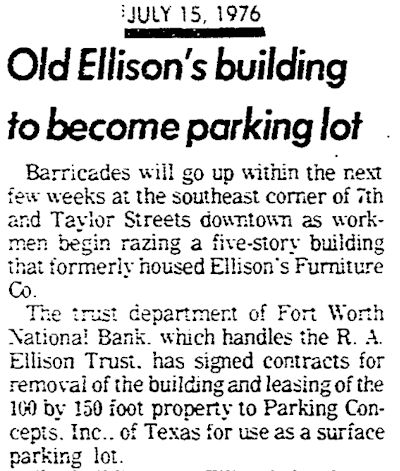 In 1966 Suniland Furniture of Houston bought the Ellison store. In 1971 the store moved from West 7th Street to 500 West 3rd Street and opened an outlet store at 9520 U.S. 80W on the West Side.
In 1966 Suniland Furniture of Houston bought the Ellison store. In 1971 the store moved from West 7th Street to 500 West 3rd Street and opened an outlet store at 9520 U.S. 80W on the West Side.
In the 1976 the Ellison building on West 7th Street was demolished to put up—what else?—a parking lot.
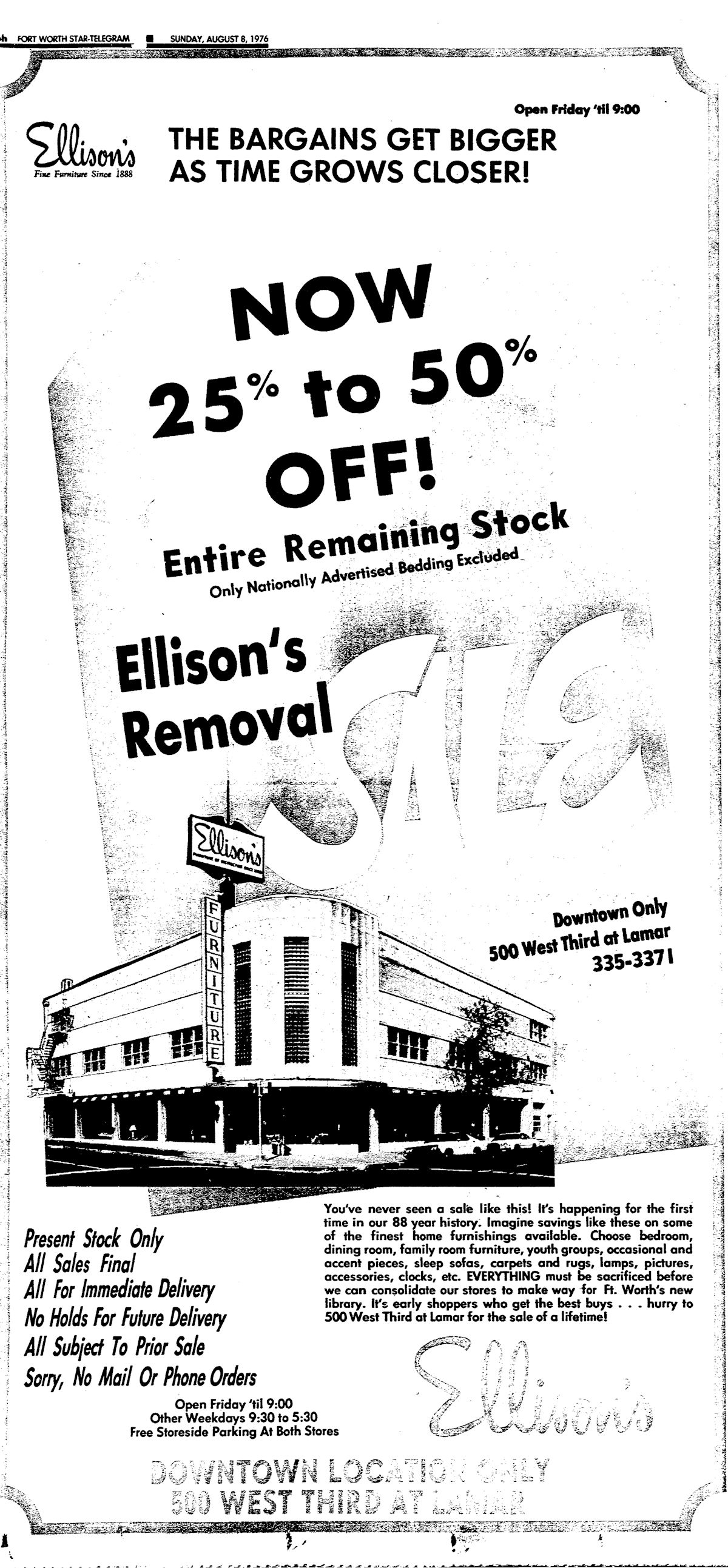 Also in 1976 the Ellison building at 500 West 3rd Street was demolished to make way for the new public library.
Also in 1976 the Ellison building at 500 West 3rd Street was demolished to make way for the new public library.
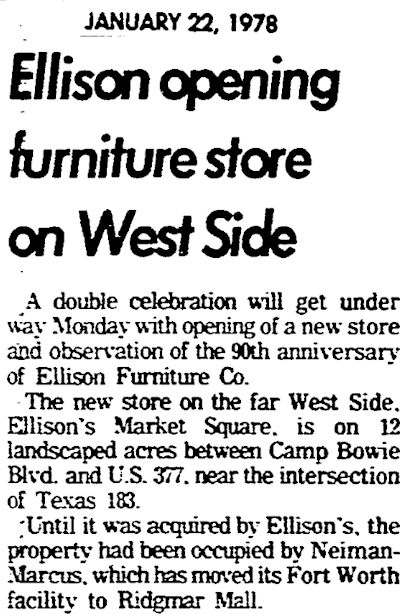 In 1978 the Ellison store moved from its U.S 80W location to the former Neiman Marcus building at 7000 Camp Bowie Boulevard. The store on U.S. 80W became a clearance center.
In 1978 the Ellison store moved from its U.S 80W location to the former Neiman Marcus building at 7000 Camp Bowie Boulevard. The store on U.S. 80W became a clearance center.
In 1992 the Ellison stores, after 104 years in business in Fort Worth, closed.
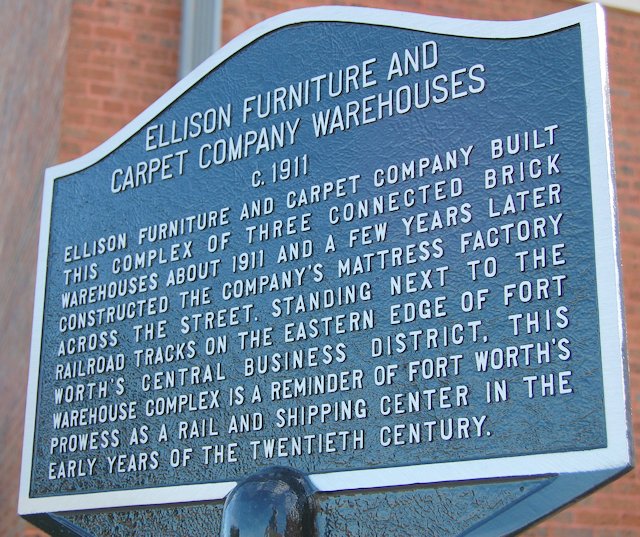 In the 1990s Scott Tindall, who owned a record-storage company, restored the five Ellison buildings on the east edge of downtown. They now house office space.
In the 1990s Scott Tindall, who owned a record-storage company, restored the five Ellison buildings on the east edge of downtown. They now house office space.
